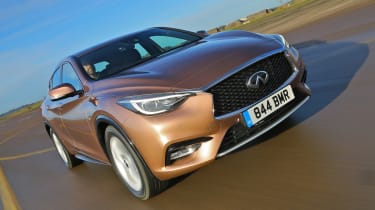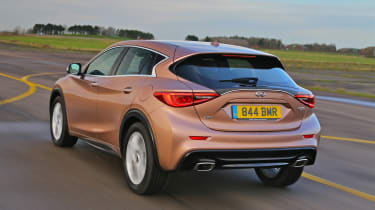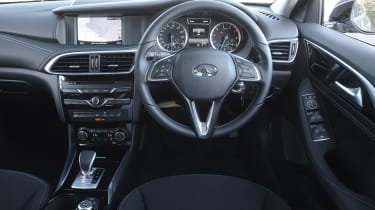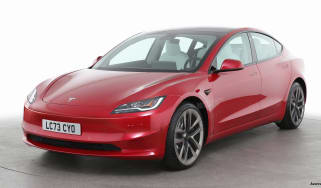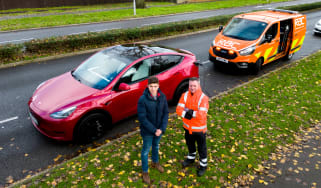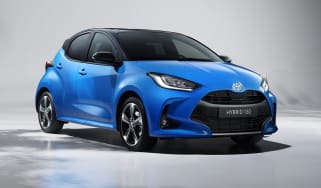Infiniti Q30 1.6 DCT automatic review
Can a smooth-shifting automatic gearbox help Infiniti's Q30 to compete with its premium hatchback rivals?
Variety is the spice of life, but adding more choice to the Infiniti Q30 range has done little to boost its appeal. This new automatic gearbox makes the hatchback feel lethargic, while the disappointing kit list and high price do it no favours either. It remains a refined and comfortable motorway cruiser, but there’ll be more fun on offer if you stick with one of the Infiniti’s desirable and capable rivals, and you’ll have more money come resale time, too.
In a market littered with talented premium cars, Infiniti has so far struggled to find its feet. But the addition of an Audi A3-fighting family hatchback seemed just what it needed to take Europe by storm.
Based on the Mercedes A-Class, the Q30 has been on sale almost a year, and comes with the choice of two petrol and two diesel engines – as well as front or four-wheel drive. In an effort to cover more bases, Infinti now offers its 1.6-litre petrol engine with a seven-speed dual-clutch automatic gearbox – and we’ve driven it here for the first time.
Commanding a sizeable £3,050 premium, speccing the auto is a hefty jump over the manual 1.6T’s reasonable £20,550 list price. You get the same mediocre kit list including a seven-inch touchscreen infotainment system, parking sensors and air-con – but there’s no sat-nav or DAB radio.
More reviews
Car group tests
In-depth reviews
Road tests
- Infiniti Q30 Sport AWD 2016 review
- Infiniti Q30 1.6 petrol 2016 review
- Infiniti Q30 2.2 diesel 2016 review
- New Infiniti Q30 2015 review
Used car tests
For those goodies, you’ll need to add the £2,270 Business Pack, which also boasts dual-zone climate control, automatic wipers and cruise control. That puts our test car on a par with a BMW 118i M Sport auto, which is faster, more frugal and comes with navigation as standard. The BMW has far stronger residuals, too.
The driving experience isn’t enough to claw back what the Q30 loses on value for money, either. The new automatic gearbox makes the car feel lethargic and unrewarding, despite changing cogs quickly and efficiently. Flooring the throttle reveals a harsh and abrasive soundtrack that encourages smoother, more sedate progress, too. Select Sport from the drive mode selector on the centre console and it'll will hold onto the revs for longer, but very rarely does this feel beneficial.
On paper it’ll do 0-62mph half a second quicker than the manual car (8.9s vs 9.4s), but in reality it doesn’t feel like there’s much in it. You need to work it harder than you do either of the diesel engines, detracting from the Q30’s relaxed nature. A Mercedes A200 gets the same engine and gearbox combination, but is more than a second faster (7.8s) to 62mph thanks to its lighter body.
What is impressive, however, is the Infiniti’s high-speed refinement. The 18-inch wheels and chunky tyres on our SE car ensured road and wind noise were kept to a minimum, while the thrashy petrol engine fades into the background at a cruise. The ride is soft, too, making light work of long motorway drives. It’s so good in fact, that you’ll have to keep a close eye on your speed, as the needle can quickly creep up beyond the 70mph national limit.
There’s a small advantage in choosing the automatic when it comes to running costs and fuel economy, but the different is so marginal that few drivers will see any real benefit. The auto will return a claimed 48.7mpg (compared with 47.1mpg for the manual), while CO2 emissions of 134g/km mean both cars fall into VED band E. Company car drivers see a single percentage point improvement in BiK (23 per cent), however. An Audi A3 Sportback 1.4 TFSI S tronic should return closer to 60mpg.

